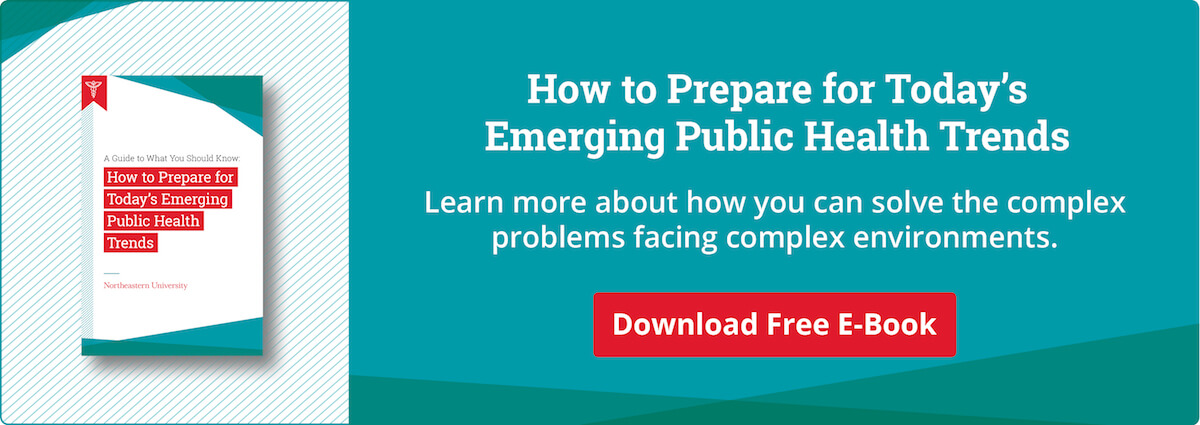As of 2018, 54 percent of the world’s population—4.2 billion people—live in cities and the metro areas around them. It is estimated that by the year 2050, that percentage will jump to 68 percent.
By bringing together millions of people from diverse backgrounds, cities often serve as incubators of innovation. The same factors that make cities such powerful innovation engines, however, can also be the source of significant challenges. As cities across the United States and around the world continue to grow, medical professionals and policymakers must bear in mind the role that urban public health will continue to play in addressing these challenges.
Read on to learn more about the responsibilities and challenges of working in urban public health, and what you can do to prepare to succeed in the field.
Download Our Free Guide to Preparing for a Career in Public Health
Learn more about how you can solve the complex problems facing complex environments.
What is Urban Health?
The study of public health involves understanding how the conditions in which we are born, live, work, play, and age (also called the social determinants of health) can impact individual and community health outcomes.
Urban health refers to this study as it applies specifically to urban populations and focuses on the unique challenges and conditions associated with urban life. Some important topics in urban health include: the ease at which disease spreads in an urban setting, physical and mental stress associated with urban living, and the existence of “food deserts” where entire neighborhoods lack equitable access to affordable nutrition.
According to Neil Maniar, director of Northeastern’s Master of Public Health in Urban Health program, the urban health discipline takes the community public health discipline and frames the concept within the context of urbanization. It’s an underserved field, he says, and one that promises great opportunity for professionals to make a major impact.
Careers in Urban Health
“When we talk about urban environments,” Maniar says, “we’re often talking about communities with high population density; places where environmental factors that influence public health, such as educational, environmental, economic, and biological conditions, can impact millions of people all at once.”
These are different from suburban or rural environments where these factors have a more limited impact. Working in urban health requires its practitioners to tease apart highly complex processes to better understand how environmental factors work together to affect these health outcomes among large populations. One might focus on, for example, trying to understand why certain major cities are seeing higher rates of cancer, violence, or cardiovascular disease, and uncover all the different factors underlying these health outcomes.
But this work only represents a fraction of the work opportunities available to urban health professionals. In a city like Boston, Maniar argues there are at least 100 different career trajectories in the public health field, many of which connect directly to the field of urban health.
“Many choose to pursue work at state or local health agencies, such as the Boston Public Health Commission or the Massachusetts Department of Health. Others choose the route of an epidemiologist, developing public health programs. And others choose to work within a healthcare system to address health disparities.”
But that’s not all, according to Maniar. By pursuing a career in urban health, you can also work directly with individuals in the community, or within a school system, housing authority, or even at the intersection of criminal justice and public health.
The Challenges of Working in Urban Health
Maniar identifies three persistent challenges he says are present in most areas of urban health work:
1. Long-term Projects
Many of the outcomes the field is trying to address are impossible to change “overnight.” Maniar says professionals in the field need to take a long-term perspective when thinking of their work. Some of the health outcomes they’re trying to affect might not yield results for five to 10 years, so they must remain determined, persistent, and patient.
“It can be frustrating to work on a long-term project and not feel like you’re impacting change. In reality, you are doing impactful, important work—it’s just that the results won’t reveal themselves until potentially years down the line. It’s important to keep this in mind.”
2. Collaboration
The need and shared desire for collaboration in the industry is both an opportunity and a challenge, Maniar says.
“Along the course of a project, you may have people who need to drop out of an effort, causing a resourcing or funding problem. Public health organizations must juggle many priorities that may impact their ability to participate at the level you would like them to.”
And because urban health contexts are fluid, he says, organizations can have emergent issues come up that affect your work:
“Say you’re focused on reducing the rate of hypertension in an area and you’re a part of a large collaborative effort when all of a sudden there’s an epidemic. Many of your community partners might have to shift their focus to those priorities, leaving you stranded.”
3. Lack of Resources
In conjunction with the above challenge, in an environment with fixed resources, including people, space, and time, it’s likely you’ll constantly be looking for new people to develop or sustain the work you’re doing. This can become challenging and force you to prioritize more effectively, Maniar adds.
Looking Forward: Trends in Urban Health
Maniar shares upcoming trends in urban health that professionals should continue to observe.
Digital Health Technology
As digital health, including telemedicine and connected health, innovations continue, the urban health industry is gaining access to innovative approaches to improve health outcomes. These will become increasingly important tools in the urban health discipline, particularly in the industry’s ability to improve healthcare access for all individuals in a community.
Health Informatics and Big Data
The urban health discipline is becoming much better at leveraging data to better understand drivers and root causes of health outcomes, Maniar asserts. By harnessing these technologies, industry professionals can develop more impactful and successful approaches to improving public health.
Increased Interdisciplinary Collaboration
Increasingly in the past decade, there has been a push toward interdisciplinary collaboration in the community. There’s now a shared understanding among community partners that health occurs in all places—virtually any community partner can play a role in improving the health of their surrounding community, and not only physically, but economically and environmentally as well.
Important Skills for Working in Urban Health
1. Broad Public Health Knowledge
In order to be effective in their roles, Maniar says that urban health professionals must have a deep understanding of and appreciation for the concepts of social justice and the social determinants of health. Urban health workers must have a concrete grasp on how all social determinants can affect health, including access to healthcare, nutrition, housing, safety, economic factors, and education, in order to be effective. With a deep knowledge of these determinants and their effects on health outcomes, the more likely those working in the field can put their skills into practice and effectively impact change to improve health outcomes.
2. Flexibility
Maniar stresses that working in urban health is challenging, and therefore it’s important for industry professionals to remain flexible. You must be able to apply your board range of knowledge to solve problems, and pivot between looking at the big and small pictures as situations require. Sometimes, he explains, it’s important to focus on data analytically, while other times it’s critical to consider the long-term or far-reaching implications of health policies and their influence on outcomes.
3. Collaboration skills
Due to the collaborative nature of most urban health initiatives, Maniar says, it’s important to hone your collaboration and interpersonal communication skills. Doing this will allow you to work more effectively with various members of the community, including practitioners, organizational leaders, community leaders, and community members.
4. Curiosity
It’s important to be a curious learner focused on constantly expanding your knowledge says Maniar. The discipline is evolving rapidly with advances in digital health technology, and connected health, and even the healthcare system itself.
“To stay relevant and to be able to propose innovative solutions,” he says, “it’s critical that you’re up-to-date on the latest industry trends.”
How to Advance Your Urban Health Career
Maniar says that there are generally high concentrations of public health professionals in small areas, giving you ample opportunity to collaborate, network, and learn from one another. Take advantage of these opportunities to help advance your career. He suggests:
- Participate in collaborations with other community partners. Many advances in public health are a product of one person reaching out to one another and saying “I’m working on this, can you help me?” Don’t be shy about sharing your industry knowledge.
- Never underestimate the importance of building your network. Make networking a priority to increase your opportunities for collaboration.
- Never stop learning. Don’t rest once you earn your degree, he says, but keep upskilling and staying abreast of industry trends to be proactive instead of reactive in your ideas. He suggests joining professional organizations, such as the Massachusetts Public Health Association or the American Public Health Association, which he says will not only provide you with knowledge but additional access to industry experts.
- Don’t be afraid to take on some of the big challenges in urban health. Although the thought of addressing issues such as violence and health disparity can be quite daunting, Maniar says, these challenges also present exciting opportunities to “apply innovative methods, think outside of the box, and tackle the same issues that folks have been trying to tackle for the last 50 years.”
How an MPH Can Help You Address Critical Issues in Urban Health
Maniar says that the value of a Master’s in Public Health is in the fundamental knowledge that it provides. An MPH (or a similar advanced degree) will give you the broad base of knowledge you need for a successful career in the field. In a degree program, you’ll gain expertise in the fundamental areas of urban health, including epidemiology, health policy, social determinants and their role in public health, and successful models you can use to improve public health.
And while Maniar maintains that you can have a successful career without a degree, what he’s seen, more often than not, is that those who don’t have an MPH do have another closely related advanced graduate degree. Generally speaking, the specialized knowledge gained in an advanced degree program is invaluable when tackling the types of complex issues that arise in the industry. Graduate public health education equips professionals to be much more impactful in work that they do.
Additionally, some top programs, like Northeastern’s Master of Public Health in Urban Health, allow students to participate in capstone projects where they elect to work with community partners, giving them the opportunity to try their hand at the collaboration he mentioned is such a critical part of success in this industry.
Interested in advancing your career in urban health? Explore Northeastern’s Master of Public Health program to find out how an advanced degree can help you get there.
Editor’s note: This article was originally published in August of 2018. It has since been updated for accuracy and comprehension.







Related Articles
Jackney Prioly Joseph on How Her MPA Helped Her Career
Master’s in Nonprofit Management vs. Public Administration
How an MPH Clarified One Alumna’s Career Path